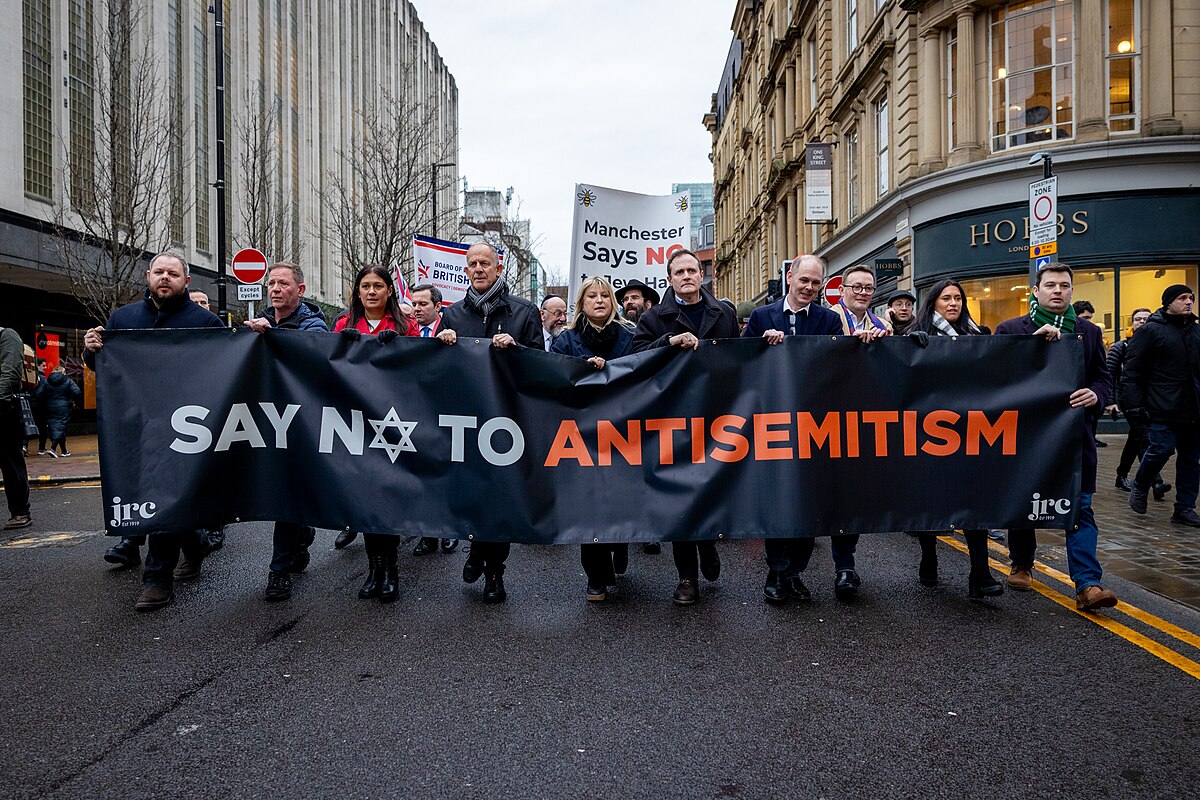A major new anthology on contemporary antisemitism, co-edited by Professor Rosa Freedman, will be published this month. Ahead of the book launch at a free event in London, Professor Freedman shares her perspectives on the anthology that brings together diverse academic responses to rising antisemitism since the Hamas atrocities in Israel on 7 October 2023.

Image: created by UK Home Office, titled ‘Security Minister Tom Tugendhat joins a march against antisemitism in Manchester on 21 January 2024 – 4.jpg’, accessed from https://commons.wikimedia.org/wiki/File:Security_Minister_Tom_Tugendhat_joins_a_march_against_antisemitism_in_Manchester_on_21_January_2024_-_4.jpg, image is licensed under the Creative Commons Attribution 2.0 Generic license.
The atrocities perpetrated by Hamas against Israelis and other citizens in Israel on 7 October 2023 were among the worst single acts of terrorism in living memory. It was the largest slaughter of Jews in a single day since the Holocaust. The hours and days following Hamas’s brutal attacks ought to have been a time when people around the world showed empathy, sympathy and/or solidarity towards Jews and Israel.
The attacks by Hamas, Al Qassam Brigades, Palestinian Islamic Jihad and their civilian Gazan supporters ought to have shocked the world to its core. They massacred communities, murdered entire families, raped and tortured young people dancing at a music festival, and kidnapped babies and older persons into Gaza. But within days, or even hours, it was clear that such solidarity was not fully forthcoming.
Over that dark weekend in October, while the massacres were still ongoing, certain key phrases kept being used on social media platforms, television and radio: “Decolonisation.” “Acts of resistance.” “Not surprising.” “Retaliation.” “Legitimate targets.” This was the first reaction of some commentators, lawyers, diplomats and others to the horrors that were unfolding. Those people sought to victim-blame, minimise or deny the atrocities and to try to contextualise them within a revisionist history of the region.
The rules of armed conflict, the laws of military engagement, and the protection of civilians under humanitarian law make it clear that acts of resistance must only be targeted against state infrastructure, apparatus or personnel, and that sexual violence can never be justified or excused. Until 7 October it went without saying that raping women and girls, murdering babies, and kidnapping the elderly are never legitimate forms of resistance to anything. Today that is less clear.
At the core of antisemitism is treating Jews as different to all other people, and treating Israel as different to all other states. The response to this terorrism ought to have been support for Jews as a people and for Israel as a state suffering from terrorist atrocities. Instead, antisemitism once again reared its ugly head in many countries around the world. Jews and Jewish institutions were threatened and attacked in person and online. As it became clear that a wave of antisemitism was rising once again, particularly in left-wing spaces and European cities, we decided to use our academic platform to document responses to 7 October and ensuing reactions.
The London Centre for the Study of Contemporary Antisemitism has the mission: ‘To challenge the intellectual underpinnings of antisemitism in public life and to confront the hostile environment for Jews in universities.’ I am a research fellow of the Centre and co-editor of its Routledge book series on contemporary antisemitism. Our call for short papers in response to the attacks received so many excellent submissions that we have published a three-volume anthology. The contributions are raw, they are urgent, and they provide documentary evidence of the antisemitism that came in the wake of the Hamas atrocities.
The books focus on three themes: (1) antisemitic discourse, (2) law and society, and (3) universities and bring together a diverse range of scholars from across disciplinary and geographic boundaries. The books are available as an anthology or as three separate volumes, and can be pre-ordered in advance of the publication date of 29 May. To mark publication of this work we will be holding a public book launch in London on Monday 3 June 2024 for those who want to learn more about this research and about contemporary antisemitism since 7 October.
Antisemitism is history’s oldest hatred. There are 14million Jews in the world. They make up 0.2% of the global population, and yet have been persecuted, expelled or slaughtered throughout history in every country where they have lived. Challenging antisemitism begins with understanding how it manifests and the impacts it has. This anthology provides valuable evidence and analysis about contemporary antisemitism to inform public debates about how to counter this hatred and discrimination in modern society.
The event will take place on Monday 3 June 2024 from 5 to 6.30pm at the University of Westminster (Little Titchfield Street Campus, 4–12 Little Titchfield Street London W1W 7BY). It is free to attend but registration is essential. Register for the event via Eventbrite.
Rosa Freedman is Professor of Law, Conflict and Global Development at the University of Reading and is a Research Fellow and co-editor of the book series at the London Centre for the Study of Contemporary Antisemitism.
